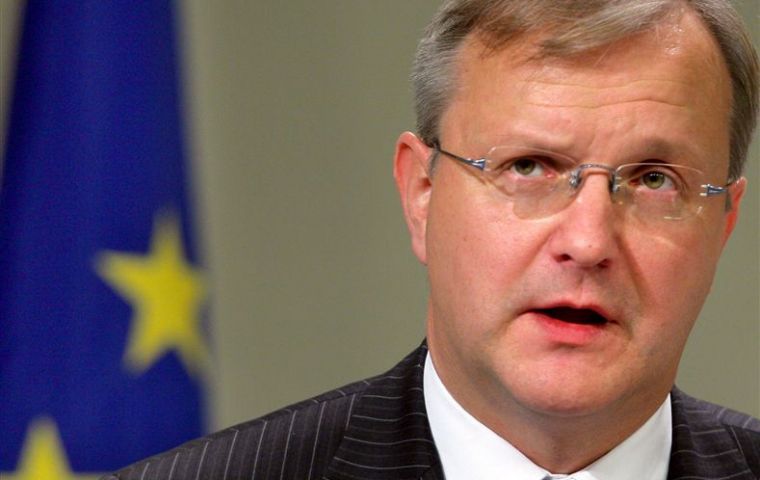MercoPress. South Atlantic News Agency
EU, ECB, IMF to visit Ireland in “short focused consultation”
 EU monetary affairs commissioner, Olli Rehn
EU monetary affairs commissioner, Olli Rehn A meeting of Euro zone ministers in Brussels ended with a promise to work towards further help for Ireland. The EU monetary affairs commissioner, Olli Rehn, said the 27-country bloc would “intensify” work on a support programme for Ireland - should Dublin request one.
He said the plan would have an “accent on restructuring its banking sector”. The meeting came against a background of renewed financial market turmoil.
At the centre of this has been the markets' fear that the governments of the weaker Euro zone countries, particularly Ireland, would not be able to afford to repay their huge debts.
Mr Rehn said that “the Irish authorities are committed to working” with the EU, the European Central Bank and the International Monetary Fund to calm market turmoil.
A statement by the Euro group following the meeting praised Ireland's efforts to combat its problems: “The Euro group welcomes the significant efforts of Ireland to deal with the challenges it faces in the budgetary, competitiveness and financial sector areas.”
The statement said the Irish government would engage in a “short and focused consultation” with the Commission, the ECB and the IMF in order to determine the best way to provide any necessary support.
It concluded by adding “We confirm that we will take determined and coordinated action to safeguard the financial stability of the Euro area, if needed and that we have the means available to do so”.
The IMF welcomed Ireland's decision to allow a “short and focused consultation” to decide if the country needs a budget bailout.
He called Ireland the most pressing challenge of today, adding that there was “an intensification of preparations of a potential program in case it is requested” but the meeting proposed no concrete course of action.
A further meeting, involving all 27 finance ministers of the EU rather than just Euro zone members, will be held on Wednesday morning.
Ireland's government has repeatedly denied that it is seeking outside support. The Irish government faces crucial parliamentary elections next November 25.
Earlier on Tuesday, Prime Minister Brian Cowen told parliament that he had not asked for bail-out money and that the Irish economy was well funded until next year. He said his country was working with European partners to deal with the debt issue, but that his country was neither “immune nor unique“ amid the recent economic crisis.
Earlier, Mr Rehn warned that Europe must ”resist alarmism“ amid the latest fears over Ireland's debts. Rehn, speaking after the talks finished said the EU would, however, step up work on support for Ireland ”with an accent” on its banks.
Uncertainty has caused the cost of Irish, Portuguese and Spanish government borrowing to rise significantly over recent weeks. Rising yields are not an immediate concern for Ireland, as it does not need to borrow money on the markets this year.
But it is for countries such as Spain, which held an auction of government bonds earlier, and other countries facing large deficits. The Spanish treasury secretary called on Dublin to act quickly to end market uncertainties.
Portugal's Finance Minister Fernando Teixeira dos Santos has urged Dublin to do the right thing for the euro and accept a bail-out.
Irish banks have struggled since 2008, when the Republic suffered a dramatic collapse of its property market. House values have fallen between 50% and 60% and bad debts - mainly in the form of loans to developers - have built up in the country's main banks, bringing them to the verge of collapse.
According to the International Settlements Bank, British banks are the most exposed in Ireland, 222.4 billion US dollars, followed by Germany, 205.8 billion; US, 113.9 billion and Spanish banks, 16.2 billion.
Reports suggest Ireland will try to reassure markets by bringing forward details of its four-year financial plan to next week.
The proposals will be severe. It has said it will impose unprecedented spending cuts or tax rises totalling 6bn euros (£5bn) to try to bring its underlying budget deficit down from about 12% to between 9.5 and 9.75% next year.
While intended to boost confidence in the country's finances, investors fear the budget cuts could plunge Ireland back into recession, leading to further losses to the government via falling tax revenues and higher benefit payments. (BBC).-




Top Comments
Disclaimer & comment rulesCommenting for this story is now closed.
If you have a Facebook account, become a fan and comment on our Facebook Page!